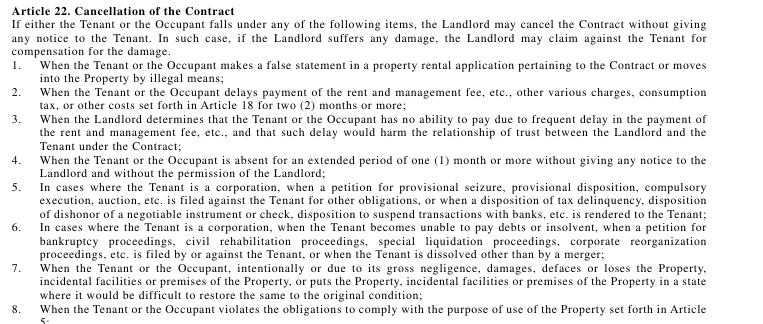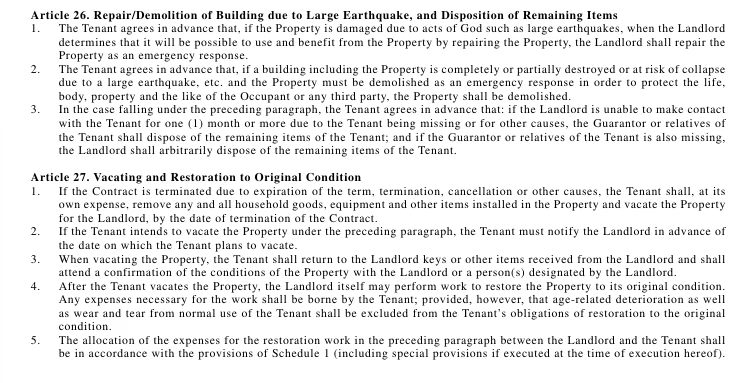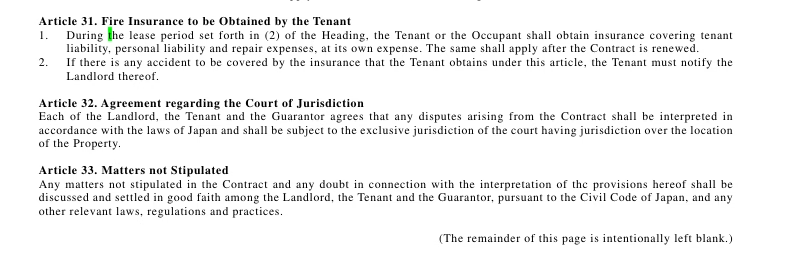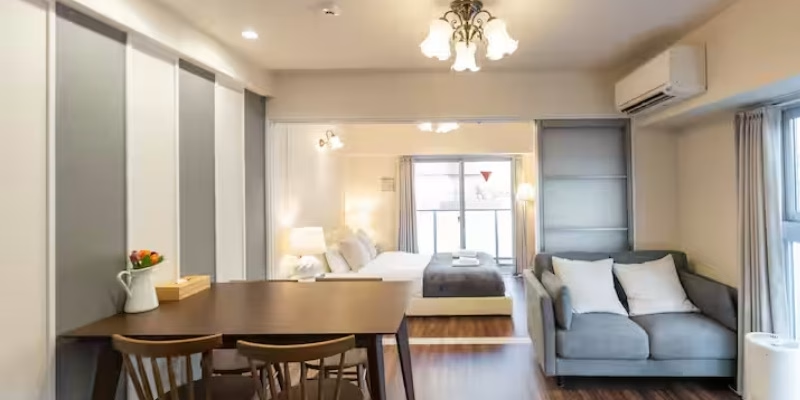Understanding a Japanese lease agreement is a key step before renting any apartment in Japan. This contract outlines essential terms such as rent, payment schedule, deposit, renewal conditions, and tenant responsibilities. For many foreigners, these clauses can be quite different from those in their home countries. By familiarizing yourself with the main parts of a Japanese lease agreement, you can avoid common misunderstandings, protect your rights as a tenant, and ensure a smooth and stress-free renting experience.
What Is a Lease Agreement?
A lease agreement is a legally binding contract between a landlord (property owner) and a tenant (renter) that outlines the terms and conditions for renting a property, whether a house, apartment, or room, for a specified period. The document includes details such as the rent amount, contract duration, renewal terms, and prohibited actions. The agreement becomes valid once both parties have signed and sealed it.
This contract ensures that tenants can occupy the property with confidence, while landlords are guaranteed a stable rental income. However, tenants should carefully review and understand the agreement before signing to prevent future misunderstandings or disputes.

Legal Definition of a Lease
Under Article 601 of Japan’s Civil Code, a lease is defined as “a contract in which one party allows the other to use an object in exchange for rent, with the obligation to return it upon contract expiration.”
In other words, tenants must pay rent in return for using the property and are required to return it in good condition at the end of the lease.
Additionally, the Land and House Lease Act provides more detailed regulations that clarify the specific rights and responsibilities of both landlords and tenants in real estate contracts.
Landlord’s Rights and Responsibilities:
- Right to receive rent as stipulated in the lease
- Authority to terminate the contract if the tenant breaches terms (e.g., unpaid rent, unauthorized alterations)
- Obligation to allow lawful use of the property during the lease period
- Duty to maintain the premises in a safe and usable condition
Tenant’s Rights and Responsibilities:
- Right to use and benefit from the property during the lease term
- Obligation to pay rent on time and in the agreed amount
- Responsibility to return the property when the contract ends
- Duty to take care of the property and avoid intentional damage

Understanding the Difference Between Regular and Fixed-Term Lease Contracts in Japan
When renting an apartment in Japan, you’ll often encounter two main types of lease agreements: the Regular Building Lease Contract and the Fixed-Term Building Lease Contract.
Understanding how they differ can help you choose the right one for your needs, whether you plan to stay long-term or only for a short period.
Category | Regular Building Lease Contract | Fixed-Term Building Lease Contract |
Overview | The standard type of lease in Japan. Usually renewable after the contract period ends. | A lease that automatically ends when the fixed period expires; not renewable. |
Best for | Tenants who plan to live long-term. | Tenants staying short-term or landlords renting for a limited period. |
Renewal | Renewal is generally possible if both sides agree. | No renewal after the contract ends. |
Termination by Landlord | Landlord can’t terminate without a valid reason. | Automatically ends at contract expiration. |
Rent Level | Usually at market rate. | Often slightly lower than market rate. |
Fees | Renewal fees or rent adjustments may apply. | No renewal fee; fewer long-term costs. |
Early Cancellation | Possible, but may include a penalty. | Difficult; cancellation before expiry is rarely allowed. |
Tenant’s Obligation | Must notify the landlord 1–2 months before non-renewal. | Must understand that the lease cannot be renewed. |
Landlord’s Obligation | Must provide reasonable notice for termination. | Must give a written explanation before signing. |
If you plan to live in Japan for several years and want more security, a regular lease contract is usually the better choice.
However, if your stay is temporary or you prefer a lower rent without long-term commitments, a fixed-term lease contract may suit you more.
Before signing, always review the contract carefully and ask your agent to explain any unclear terms. Understanding these two lease types helps you avoid surprises and ensures a smooth renting experience in Japan.
Required Documents and Procedures Before Signing a Rental Contract
Before finalizing a rental agreement, several steps and documents are required. The process typically involves submitting an application, having it reviewed by the landlord, receiving an explanation of key terms in the Important Matters Explanation Form, and then reviewing and signing the lease agreement. Note that the lease becomes legally binding only after both the tenant and landlord have signed and sealed it, not at the explanation stage.
To prepare for the contract, tenants usually need to provide documents such as a resident’s card, seal certificate, bankbook, and proof of income, though exact requirements may vary depending on the property or agency. These documents can take a few days to obtain, so it’s best to prepare in advance, especially if a guarantor is required.
- Resident’s Card (在留カード): This serves as proof of your legal residence and current address in Japan. It’s often required for both the tenant and any family members who will live in the apartment.
- Registered Seal / Hanko (実印): Instead of a handwritten signature, contracts in Japan are typically stamped with a personal seal. If you don’t have one yet, you’ll need to register your hanko at your local municipal office before signing.
Preparing these documents early will help ensure a smooth and timely contract process.
Key Terms in Japanese Rentals
When searching for an apartment for rent Japan, you will encounter several terms describing fees, policies, and apartment features. Here’s what they mean:
- Shikikin (敷金 / Security Deposit): A refundable deposit paid to the landlord, typically 1–2 months’ rent. It covers damages or unpaid rent.
- Reikin (礼金 / Key Money): A non-refundable fee given to the landlord as a gesture of thanks. Common in older apartments but less so in newer or foreigner-friendly rentals.
- Kanri-hi (管理費 / Maintenance Fee): Monthly fee for building management, cleaning, and shared utilities. Often listed separately from rent.
- Chintai-ryo (賃料 / Rent): The monthly rental fee. Listings often separate this from other costs like utilities.
- Kyoeki (契約 / Lease Contract): The formal rental contract specifying duration, fees, and rules. Usually 1–2 years.
Furnished vs. Unfurnished: Most apartments in Japan are unfurnished. Some foreigner-friendly apartments Tokyo may provide basic furniture. - Hoken-ryo (保険料 / Fire Insurance Fee):
A mandatory insurance fee that covers damage from fire, water leaks, or other unexpected accidents. Tenants are usually required to purchase fire insurance when signing the lease, often costing around ¥15,000–¥20,000 for two years. - 24-Jikan Sābisu-hi (24時間サービス費 / 24-Hour Support Fee):
A small monthly fee (usually ¥500–¥1,000) that provides access to a 24-hour emergency support line for issues such as lost keys, plumbing problems, or equipment malfunctions.
How to Read a Rental Contract and Avoid Common Problems
Before signing a rental contract, it’s essential to read every detail carefully. A lease agreement includes key information such as the contract period, rent payment methods, renewal terms, and your responsibilities as a tenant. Understanding these points in advance will help you avoid future issues. Below are the important sections to pay close attention to before signing.
Deposit, Key Money, and Rent Payment Details
Start by confirming that the initial costs, including security deposit (shikikin), key money (reikin), monthly rent, and management fees, match what your agent or landlord told you.
Double-check the payment method (bank transfer, auto-withdrawal, etc.) and the due date for monthly rent.
Most properties in Japan require advance payment, meaning you pay for the upcoming month. However, some may use a post-payment system.
Also, review clauses about:
- Late payment fees
- Possible rent increases
- Deposit refund conditions
These directly affect your monthly expenses, so make sure everything is clear and accurate before signing.
The contract excerpt shown here (Articles 8–9) explains these terms in legal language:
Article 8 – Security Deposit
This section describes how the tenant must pay the deposit when signing the contract, how it might increase if rent changes, and the rules for refunding it when the tenant moves out. It also states that the deposit cannot be used to pay other debts or rent, and that no interest is paid on it.
Article 9 – Key Money
This clause clarifies that the tenant pays key money to the landlord at the start of the contract, and that this payment is non-refundable once the agreement is formed.
Together, these sections define the financial obligations between tenant and landlord — what you must pay upfront, what may be refunded, and what is considered a one-time fee.

Discover apartments with no deposit and no key money in Tokyo:
- Find no-deposit, no-key-money listings in Shinjuku Ward
- Browse zero-deposit, zero-key-money apartments in Nakano Ward
Emergency Contact Information
Your lease will include the landlord’s contact details and, if applicable, the management company in charge of maintenance or emergencies.
Know exactly who to contact for issues like:
- Water leaks
- Equipment malfunctions
- Noise complaints
- Lease renewal inquiries
You’ll also need to provide your own emergency contact (a family member, friend, or colleague).
If this information changes later, notify your landlord or agency immediately — being unreachable in an emergency can cause major complications.

Guarantor or Joint Guarantor Requirements
In Japan, most rental agreements require a guarantor (連帯保証人) – a person who agrees to pay the rent or cover repair costs if the tenant fails to do so.
However, instead of asking for an individual guarantor, many contracts now use a guarantee company (保証会社).
This is clearly stated in the contract section titled “Article 25-2. Guarantee Company”, which explains that: “The Tenant shall, instead of obtaining a joint guarantor, execute a guarantee service agreement with the Guarantee Company designated by the Landlord.”
In other words, the tenant must sign a separate agreement with a Guarantee Company (such as a consumer finance or insurance firm) to secure the lease. This system reduces the burden on individuals who would otherwise need to act as guarantors.
Key points to note:
- Guarantee company fees: The tenant pays for the guarantee service at their own expense (as mentioned in paragraph 1 of the article).
- Delayed payment: If the guarantee company pays the rent on behalf of the tenant, the tenant must reimburse the company later (paragraph 2).
- Contract cancellation: If the guarantee service is terminated or renewal is refused, the landlord can cancel the lease unless a new guarantor is provided (paragraph 3).
Example from the sample contract: “In order to secure obligations to pay the rent, etc. to the Landlord under the Contract, the Tenant shall, instead of obtaining a joint guarantor, execute a guarantee service agreement with the Guarantee Company…”
This means that for your lease, you’ll likely be required to:
- Sign a contract with a designated guarantee company, and
- Pay an initial and annual guarantee fee (amounts vary by company and property).

Renewal Procedures and Fees
Most rental contracts in Japan are valid for two years.When the lease term ends, tenants are usually required to pay a renewal fee (更新料) — typically equal to one or two months’ rent, plus minor administrative costs.
At the time of renewal, the landlord may also review conditions such as:
- Rent amount
- Contract duration
- Other renewal terms
In general, leases are automatically renewed unless either the tenant or landlord gives notice in advance.
For standard (non–fixed-term) contracts, landlords cannot refuse renewal without a valid reason if the tenant wishes to continue.
These details are usually outlined in the “Contract Period and Renewal” and “Renewal Fee” sections of the agreement, which specify the renewal cycle and payment obligations.

Contract Cancellation Procedures
If you plan to move out before your lease expires, you must give notice, usually one or two months in advance, depending on the contract.
Check for:
- The notice period (often written in months)
- The required format (email, written letter, or agency form)
Some contracts include a template for this process. Submitting your notice late can result in extra rent charges, so prepare early and confirm the process with your agent.

Prohibited or Restricted Acts
Toward the end of your contract, there’s often a “Prohibited ” or “Restricted Acts” section.
These clauses override general terms, so even small details here can have big consequences.
Common examples include:
- Keeping pets or musical instruments without permission
- Subletting or letting others stay without approval
- Modifying or redecorating the property without consent
- Using the property for purposes other than residential living
These points are usually stated in the “Prohibited or Restricted Acts” section of the contract.
They aim to protect both the landlord’s property and the comfort of other residents.
While Japan’s MLIT (Ministry of Land, Infrastructure, Transport and Tourism) provides general housing guidelines, the exact restrictions and penalties in your contract will take precedence.
Therefore, it’s important to read this section carefully to understand what actions might lead to extra fees or termination of the lease.

Restoration and Repair Costs
Under MLIT standards, tenants must repair damage caused intentionally or by negligence, but not normal wear and tear (like small scratches or fading paint).
If something breaks during your stay – say, an air conditioner – who pays depends on the cause:
- Normal aging: landlord’s responsibility
- Damage from misuse: tenant’s responsibility
These principles are often written in sections like “Vacating and Restoration to Original Condition”, stating that tenants must return the property to its original state when moving out, except for normal deterioration.
Understanding this part of the contract helps prevent misunderstandings when it comes to moving out procedures or deposit refunds, as it clarifies which repairs or cleaning fees each side must bear.

Facilities vs. Leftover Items
Your lease lists official facilities (設備) – such as built-in air conditioners, lighting, or kitchen appliances – that the landlord must maintain.
However, items left behind by previous tenants (残置物) are not officially included.
You can use them, but repairs or replacements won’t be covered if they break.
If you don’t need them, ask the landlord to remove them before moving in – and never dispose of them yourself without permission.

Fire Insurance and Its Importance
In Japan, fire insurance (火災保険) is a mandatory requirement for most rental contracts.
It covers not only fire damage but often includes compensation for water leaks, accidents, or other unexpected incidents.
If a fire or accident occurs:
- The tenant may be responsible for repair costs inside the rented unit.
- If the damage affects neighboring units, the tenant may also need to cover those losses unless another party is clearly at fault.
This rule is usually stated in the “Fire Insurance to be Obtained by the Tenant” section of the contract, which requires tenants to purchase and maintain fire insurance during the lease period.
It’s a small yearly cost (often just a few thousand yen) but provides essential protection against large financial risks.

Begin Your Apartment Hunt in Japan with Arealty
Searching for an apartment in Japan can be daunting, particularly if you’re new to the country. From guarantor requirements and upfront fees to contracts written entirely in Japanese, the process can feel overwhelming. Working with the right team can simplify every step and make your move stress-free.
Why Partner with Arealty Japan?
- Multilingual Support: Our team speaks English, Japanese, and Vietnamese, ensuring clear communication at every stage.
- In-Depth Market Knowledge: We know Tokyo’s rental landscape inside out and understand the challenges foreign residents face.
- Comprehensive Assistance: Whether browsing listings, scheduling viewings, signing your lease, or settling in, Arealty provides guidance at every step.
- Transparent & Straightforward Process: We focus on clarity and simplicity, so you always know what to expect and can rent with confidence.
With Arealty Japan, securing an apartment for rent in Tokyo is easier than ever. Our bilingual experts help you find everything from compact studios to spacious apartments in Japan Tokyo, letting you focus on starting your new life in Japan.
Contact: 050-6864-9697
Website: https://arealty.jp
Conclusion
Understanding Japanese rental terms is essential for a smooth and stress-free housing experience. By familiarizing yourself with key concepts such as shikikin (security deposit) and reikin (key money), you can make informed decisions and avoid unexpected costs or misunderstandings.
Whether you’re searching for a cozy studio, a modern flat, or a family-sized apartment in Tokyo, Arealty Japan is here to guide you every step of the way. Our bilingual team ensures clear support throughout the process from exploring listings and reviewing contracts to settling comfortably into your new home.
With a solid grasp of Japanese rental terms, renting in Japan doesn’t have to be complicated. The right knowledge and support make finding your ideal Tokyo apartment transparent, simple, and exciting.






Leave a Reply